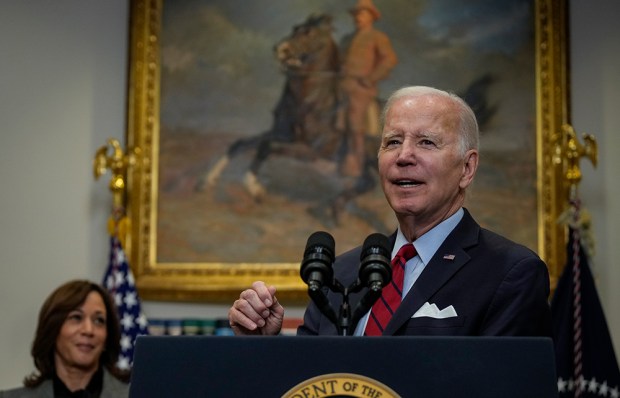I sympathised with Leave voters who yearned to ‘take back control’ of British borders. After all, if being a country means anything, it surely entails first and foremost a clear understanding of who comes under that country’s protection — and who doesn’t. Otherwise a country is just a patch on a map.
Yet I’ve always found Leavers’ high hopes for reduced immigration heartbreaking. Cutting ties with the EU was never going to limit the migrants apt to put the greatest pressure on British borders this century: immigrants from outside the EU, especially from high-birth-rate countries in Africa and the Middle East — who, absent an unlikely new agreement by the end of the Brexit transition period, will only be more difficult to return to the Continent.
Back in 1984, the editorial board of America’s right-leaning Wall Street Journal argued for a five-word constitutional amendment: ‘There shall be open borders.’ But such outright support for goodie bags brimming with bottled water and ‘Welcome to the USA!’ coffee mugs on the American side of the Rio Grande is rare. Two years ago, even the Journalbacktracked on open borders, when the board couldn’t stick the reality of what they’d been inviting: a rowdy caravan of more than 7,000 overwhelmingly unskilled, impoverished Hondurans teeming towards Texas.
The left will often gesture limply towards controlled immigration, while advocating policies that so reward violating immigration statutes, and that so tie the hands of immigration authorities, that the position amounts to open borders in all but name. These days, leftists perceive any enforcement of immigration law as racist.
Alas, among conservatives, we often see a parallel disingenuousness. Centre-right politicians make rhetorical noises about sending illegal immigrants packing, while never addressing the primary pull factors. Frustrated by bureaucratic impotence, civil servant incompetence, endless legal gambits and appeals, they conspicuously fail to put deportations where their mouths are. Behold, open borders in all but name.
During this year’s mini-deluge of some 5,500 ‘unauthorised’ migrants crossing the English Channel in small boats (though I foretell that you ain’t see nothin’ yet), the Home Secretary Priti Patel has clearly been making an effort, but to little effect. Since January last year, the UK has sent all of 155 boat people back to Europe. So we can share the poor woman’s exasperation that when 23 illegal migrants were all set to be flown back to Spain last week, the Home Office was hit by what in cyberspace is called a ‘denial of service attack’: a maelstrom of last-minute legal actions by, said Patel, ‘leftie Labour-supporting lawyers’. All 23 amateur seafarers remain ensconced in Britain without having collected any air miles.
Once migrants land in Kent — whose facilities for migrant children are full to bursting and whose funds for such services are dry — new arrivals are in like Flynn, and they know it. In Smartphone World, our tourists for life are better informed about immigration law and about what to expect, or even demand, on arrival than their own taxpayer-financed lawyers. The odd poor student is brought up to speed pronto by a phalanx of NGO worthies whose driving purpose is to thwart unfriendly immigration policies, and who coach refugees on what to say. That’s why Patel wants to introduce a new rule to prevent asylum applicants from adding different grounds for refugee status later in the process.
Chartered deportation flights cost a mint: last year, £12,000 per deportee. (And you thought BA was steep.) That figure excludes the vast resources required to fight endless court battles. Two or three years ago, during a protest intended to block the return of a woman from Zimbabwe, I noted that she’d been turned down for asylum in Britain seven times. Yet there she was on the news, still in London. Those seven denials don’t merely imply bother. They imply money.
Each case can take years as well — allowing migrants to have children or marry, and then claim a right to family life. Further, we’ve established a feedback loop. Every time an ambitious cross-Channel kayaker secures free housing and healthcare, a little allowance and a job on the black market, all without getting wet, our successful adventurer effectively sends ‘Wish you were here’ postcards to multiple friends and relatives. Every additional relative means still more relatives get permission to stay because they have a relative in the UK.
Brought in by Allied nations justifiably guilt-ridden about not having taken in enough Jews fleeing the Nazis, the post-war asylum system is now widely abused. Only in the past few years have I even heard the expression ‘illegal immigrant’ in the UK; before then, every uninvited visitor was an ‘asylum seeker’. However well migrants have read up on the convincing reasons to claim asylum, the chances that a majority of Europe’s purported asylum seekers are actually escaping persecution are slight. Said widespread abuse reduces the chances that genuinely persecuted applicants are given the green light. But little matter. Most failed applicants aren’t going anywhere.
Western immigration enforcement is drowning in due process. It’s too costly, too complicated and too hard. In sum, it’s a farce. The deck is powerfully stacked against the state, because the state has stacked the deck against itself. Highly complex systems are easy to game, and that’s assuming illegal arrivals even bother to game them. Word to the wise: never trust immigration figures. Those are only the people the government knows about.
Good luck to Ms Patel with overhauling asylum law in her ‘fair borders bill’ slated for later this year. But I hope she forgives my cynicism. The Home Office’s history on immigration is chaotic and ineffectual, as well as arbitrary — for the department has sometimes chosen to put its foot down with the most deserving (see: Windrush).
One bit of advice, Priti. Offshore asylum applications if you can, because the moment migrants physically set foot in your country, they are your problem. Still, I’m not holding my breath for Britain ‘taking back control’ of its borders anytime soon.
Got something to add? Join the discussion and comment below.
Get 10 issues for just $10
Subscribe to The Spectator Australia today for the next 10 magazine issues, plus full online access, for just $10.
spectator.co.uk/lionelshriver - The argument continues online.
You might disagree with half of it, but you’ll enjoy reading all of it. Try your first month for free, then just $2 a week for the remainder of your first year.















Comments
Don't miss out
Join the conversation with other Spectator Australia readers. Subscribe to leave a comment.
SUBSCRIBEAlready a subscriber? Log in